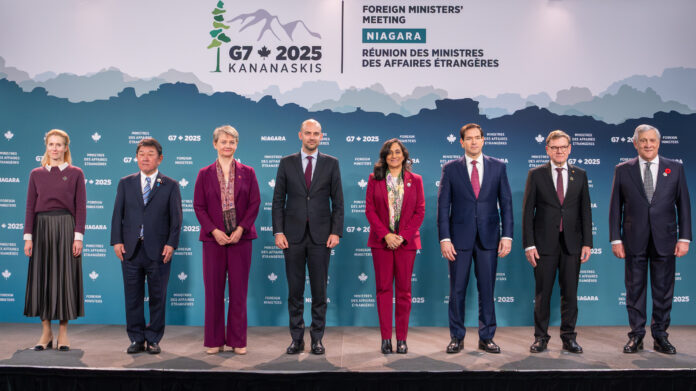The setting is pastoral, almost timeless. But beneath the surface of diplomatic smiles, G7 foreign ministers are meeting this week in Canada for what may be the most politically charged summit in months. The official theme: “Peace in Ukraine and the Middle East.” The real themes: the erosion of Western unity, geoeconomic realignment, and the creeping return of bloc logic.
Behind the Peace Rhetoric, a Fragmented Diplomacy
This G7 November 2025, limited to a ministerial format, aims to be sober but operational. Officially, it’s about “laying the groundwork for sustainable peace” in both Ukraine and the Middle East. But behind that noble ambition, Western diplomats are struggling to hide their divisions.
On Ukraine, the unity of 2022 has given way to strategic fatigue. Washington speaks of “reconstruction,” Berlin of “realistic defense,” Paris worries about a “frozen conflict.” There’s no indication these lines are aligning. The absence of the U.S. president only strengthens the sense of a summit being managed at arm’s length.
As for the Middle East, the cacophony is barely masked. France pushes for a humanitarian corridor in Gaza. Italy fixates on Iran. The United States, loyal to its double-standard doctrine, oscillates between support for Tel Aviv and outreach to Riyadh. Again, the illusion of coordinated diplomacy buckles under the weight of national agendas.
The Hidden Agenda: Sovereignty, Minerals, Artificial Intelligence
What doesn’t appear in the press releases—but is evident to any attentive observer—is that G7 November 2025 is also a disguised economic summit. Beneath the rhetoric of rights and values, discussions revolve around critical minerals, access to strategic technologies, and industrial sovereignty.
China, though never named, haunts every conversation. Every phrase about “secure supply chains” translates into anxiety over tech dependency. Every mention of artificial intelligence is a veiled cry of panic about China’s global standard-setting dominance.
The Arctic, suddenly reintroduced into G7 language, is no environmental whim—it’s a latent theater of confrontation with Moscow and Beijing over resources and shipping routes.
A West in Strategic Drift
This November G7 feels like a crisis meeting without calling itself one. The language is polite, but the postures are tense. Canada, hosting, tries to steer a consensual course. But it’s clearly Washington setting the pace, with Marco Rubio (now Secretary of State) on a pre-election soft-power campaign.
Europe, as ever, wavers between Atlanticist obedience and fantasies of strategic autonomy. But without tangible tools, the stance remains rhetorical. The Franco-German duo is silent. The EU as a credible diplomatic actor remains an unfulfilled promise.
The End of Bland Consensus
G7 November 2025 will not be a spectacular summit. But it may mark a quiet turning point. A moment when Western democracies stop pretending perfect unity. A moment when the liberal order begins to acknowledge its cracks. Perhaps even the moment when Europe realises it must arm itself with will, not just principles.
In a world where blocs are reforming, where war has returned as a political tool, and where strategic resources matter more than peace declarations, this quiet G7 is a signal. Not a solution.



